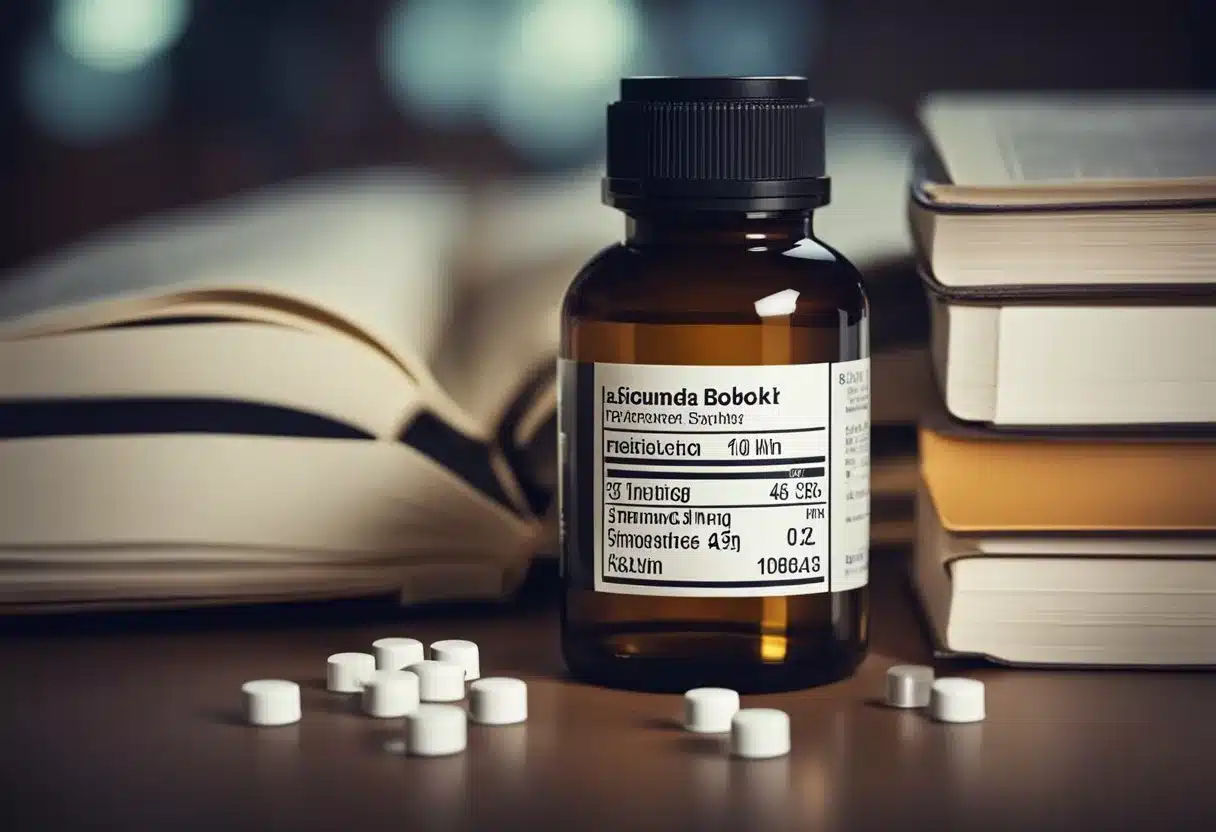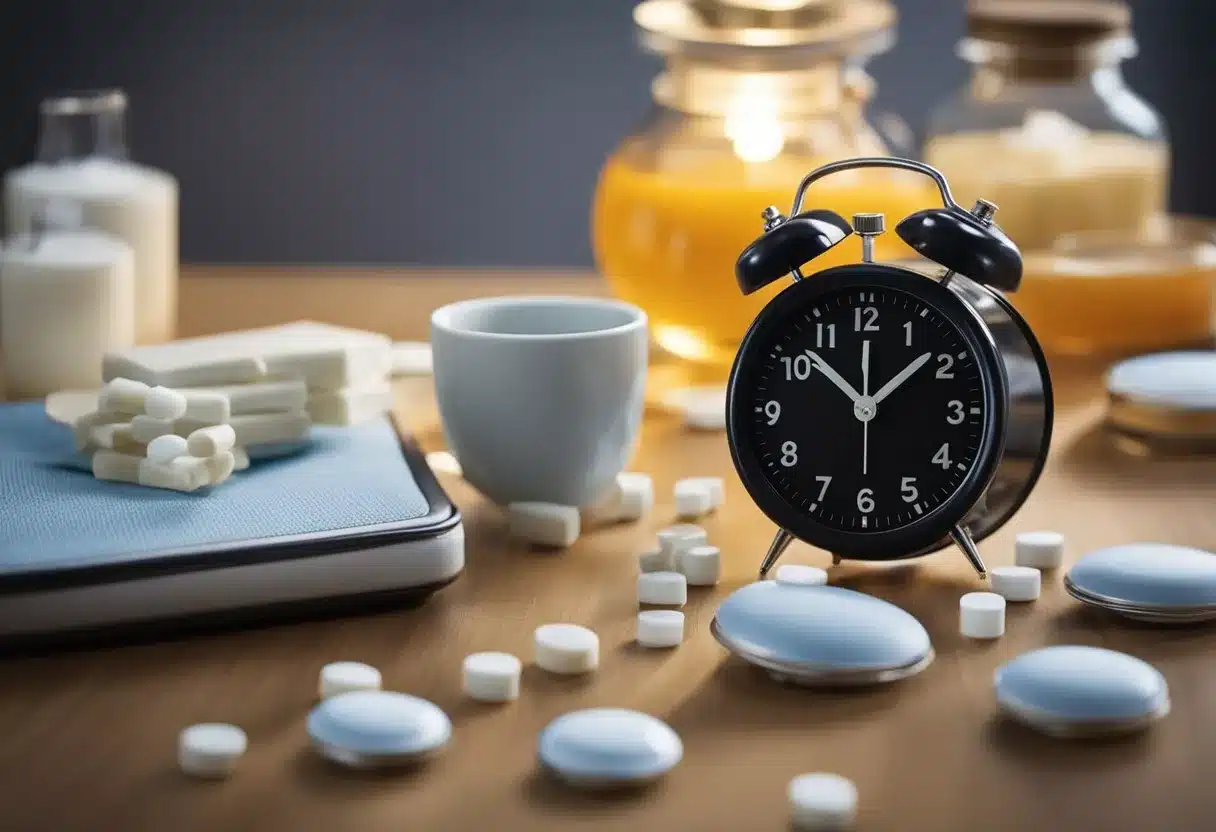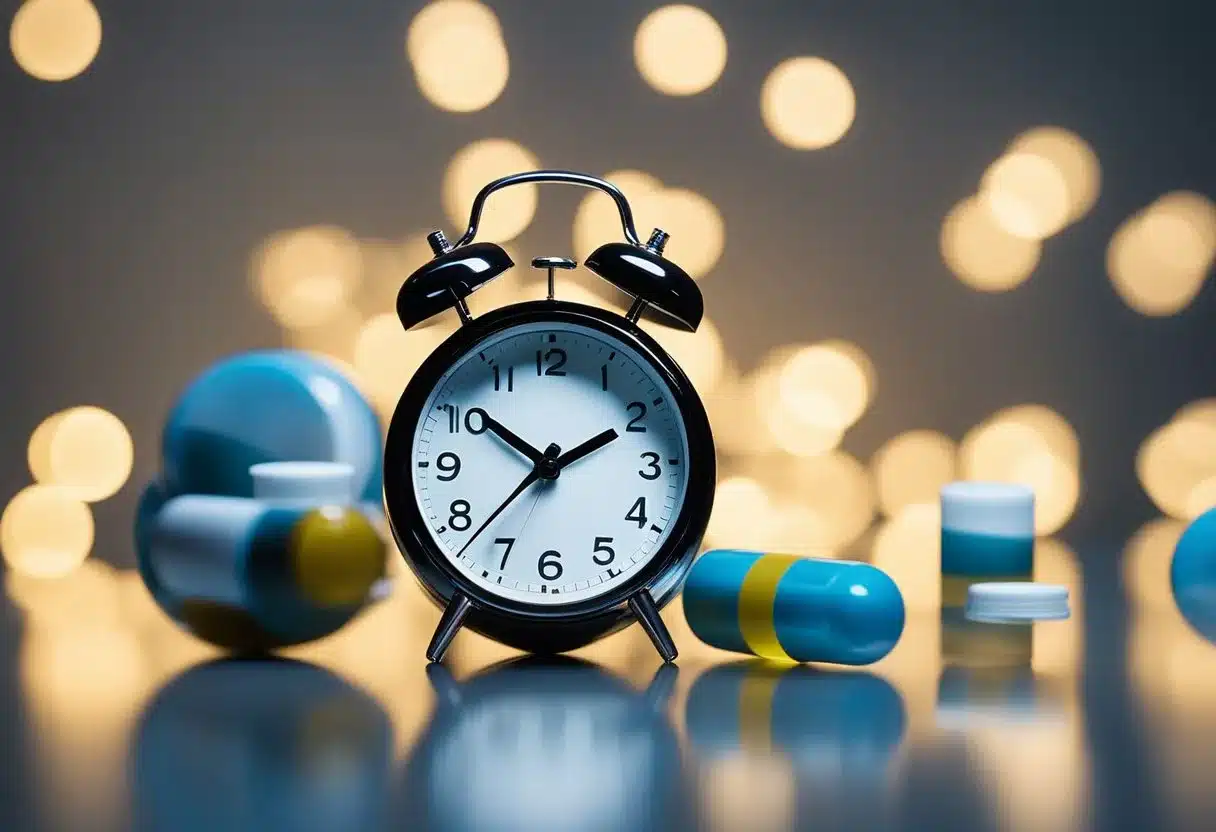Trouble sleeping can be frustrating, especially when it’s caused by medicines meant to help you. Many common drugs can lead to sleepless nights as a side effect. Some medications that can cause insomnia include certain antidepressants, blood pressure drugs, and stimulants used to treat conditions like ADHD.
 [1]
[1]What to do before bed to sleep better:
Watch the video NOW![2]
Sleep problems from medicines can happen for different reasons. Some drugs make you more alert or change your sleep cycles. Others may cause physical symptoms that keep you awake. Knowing which medicines might affect your sleep can help you work with your doctor to find solutions.
If you’re having sleep issues, don’t stop taking any prescribed drugs without talking to your doctor first. There may be ways to adjust your medication routine or try alternatives that don’t disrupt sleep as much. Good sleep is important for health, so it’s worth addressing medication-related insomnia.
Key Takeaways
- Many common medications can disrupt sleep as a side effect
- Antidepressants, blood pressure drugs, and stimulants often cause insomnia
- Doctors can help adjust medication routines to improve sleep quality
Understanding Insomnia

Insomnia is a common sleep disorder that affects millions of people worldwide. It can have significant impacts on daily life and well-being.
Types of Insomnia
There are two main types of insomnia: acute and chronic. Acute insomnia lasts for a short time, usually a few days or weeks. It often happens due to stress or changes in sleep environment.
Chronic insomnia lasts for a month or more. It can be primary, meaning it’s not linked to other health issues. Or it can be secondary, caused by other conditions or medications.
Some people have onset insomnia, which makes it hard to fall asleep. Others have maintenance insomnia, where they wake up during the night and can’t get back to sleep.
Causes and Risk Factors
Many factors can lead to insomnia. Stress is a big one. Work pressure, relationship problems, or money worries can keep the brain active at night.
Poor sleep habits like irregular bedtimes or using screens before bed can disrupt sleep. Medical conditions such as chronic pain, sleep apnea, or restless leg syndrome often cause insomnia.
Some medications can also interfere with sleep. These include certain antidepressants, blood pressure drugs, and allergy medicines.
Age and gender play a role too. Insomnia becomes more common as people get older. Women are more likely to experience it than men.
Effect on Mental and Physical Health
Insomnia can have wide-ranging effects on health. It often leads to daytime fatigue, making it hard to focus or remember things. This can affect work or school performance.
The disorder can also impact mental health[3]. It’s linked to higher rates of anxiety and depression. Some people get stuck in a cycle where insomnia worsens mood, and poor mood makes it harder to sleep.
Physically, long-term insomnia may increase the risk of health problems. These include high blood pressure, heart disease, and diabetes. It can weaken the immune system, making it harder to fight off illnesses.
Medication-Induced Insomnia

Many common medications can disrupt sleep patterns and lead to insomnia. The impact on sleep often depends on the drug type, dose, and how a person’s body reacts.
Common Medications That Can Cause Insomnia
Several types of medications can trigger insomnia[4]. Beta-blockers, used for high blood pressure and heart conditions, may cause sleep problems. Examples include metoprolol, carvedilol, and propranolol.
Corticosteroids, which treat inflammation, can also affect sleep. Some antidepressants, especially SSRIs, may lead to insomnia as a side effect.
Cold and allergy medications with pseudoephedrine can keep people awake. This ingredient is often found in over-the-counter decongestants.
Stimulant medications for ADHD, like amphetamines, can make falling asleep difficult.
Physiological Impact on Sleep
Medications can interfere with sleep in different ways. Some drugs affect neurotransmitters in the brain that regulate sleep-wake cycles.
Beta-blockers may reduce melatonin production[5], a hormone crucial for sleep. This can lead to trouble falling asleep and nightmares.
Stimulants increase alertness and can make it hard to relax at bedtime. They may also cause rebound fatigue as they wear off, disrupting sleep patterns.
Some medications alter REM sleep, leading to less restful sleep even if a person sleeps for a full night.
Duration and Dosage Considerations
The severity of medication-induced insomnia often relates to dosage and timing. Taking certain medications later in the day can increase the risk of sleep problems.
Higher doses typically lead to more pronounced side effects, including insomnia. Doctors may recommend starting with a lower dose and gradually increasing it.
Some people experience insomnia only when starting a new medication. The body may adjust over time, and sleep patterns might improve.
For long-term medications, doctors might suggest splitting the dose or changing the timing to minimize sleep disruption.
Psychotropic Medications

Psychotropic medications affect brain chemicals and can disrupt sleep patterns. Some may cause insomnia while others lead to daytime drowsiness. The effects can vary between different drug classes and individuals.
Antidepressants and Insomnia
Some antidepressants can cause sleep disturbances[4] as a side effect. These medications work by changing levels of brain chemicals like serotonin. Common antidepressants that may lead to insomnia include:
- Selective serotonin reuptake inhibitors (SSRIs)
- Serotonin-norepinephrine reuptake inhibitors (SNRIs)
- Bupropion
SSRIs and SNRIs can cause agitation or restlessness in some people. This may make it harder to fall asleep at night. Bupropion can increase energy and alertness. Taking it too close to bedtime might keep a person awake.
Not all antidepressants cause sleep issues. Some may even improve sleep. A doctor can help find the right medication with fewer sleep-related side effects.
Benzodiazepines and Sleep
Benzodiazepines are anti-anxiety medications that can affect sleep in different ways. Short-term use often helps with insomnia. But long-term use can lead to tolerance and sleep disturbances[5].
Common benzodiazepines include:
- Xanax (alprazolam)
- Ativan (lorazepam)
- Valium (diazepam)
These drugs can cause daytime drowsiness. This may lead to napping, which can then disrupt nighttime sleep. Stopping benzodiazepines suddenly can cause rebound insomnia.
Doctors often prescribe these medications for short-term use only. This helps avoid sleep problems and dependence.
Mood Stabilizers and Nighttime Wakefulness
Mood stabilizers treat conditions like bipolar disorder. They can sometimes interfere with normal sleep patterns. Common mood stabilizers include:
- Lithium
- Valproic acid
- Carbamazepine
These medications may cause increased urination. This can lead to nighttime wakings to use the bathroom. Some people also report vivid dreams or nightmares while taking mood stabilizers.
Lithium, in particular, can cause sleep disturbances. It may lead to frequent waking during the night. Adjusting the dosage or timing can sometimes help reduce these effects.
Not everyone experiences sleep problems with mood stabilizers. Many find their sleep improves as their mood becomes more stable.
Respiratory and Allergy Medications

Medicines for breathing and allergy issues can affect sleep in different ways. Some help you rest better, while others might keep you awake at night.
Decongestants and Sleep Interruptions
Decongestants like pseudoephedrine can make it hard to fall asleep. These drugs open up stuffy noses but also act as stimulants. They can cause:
- Racing heart
- Feeling jittery
- Trouble relaxing at bedtime
Even nasal sprays with pseudoephedrine may lead to sleep problems. People often use these medicines for colds or allergies. It’s best to take them earlier in the day to avoid nighttime sleep issues.
Asthma Medications Affecting Sleep
Asthma drugs can impact sleep in different ways. Some medicines used to treat asthma include:
- Inhaled corticosteroids
- Long-acting beta-agonists
- Leukotriene modifiers
These medications may cause side effects like:
- Nervousness
- Rapid heartbeat
- Tremors
Such effects can make it tough to fall asleep or stay asleep through the night. However, untreated asthma symptoms can also disrupt sleep. It’s important to work with a doctor to find the right balance.
Antihistamines’ Dual Effects
Antihistamines can have mixed effects on sleep[5]. Some types make people drowsy and are used as sleep aids. Others can cause alertness and disrupt sleep.
Older antihistamines often cause drowsiness. Examples include:
- Diphenhydramine
- Doxylamine
Newer antihistamines are less likely to cause sleepiness. These include:
- Loratadine
- Cetirizine
- Fexofenadine
People react differently to these drugs. Some may feel sleepy, while others feel more awake. It’s wise to try a new antihistamine during the day first to see how it affects alertness.
Cardiovascular and Blood Pressure Medications

Some heart and blood pressure medicines can make it hard to sleep. These drugs help the heart but may have side effects that keep people awake at night.
Beta Blockers and Insomnia
Beta blockers[4] are common drugs for high blood pressure and heart problems. They slow down heart rate and lower blood pressure. But they can also cause sleep issues.
Beta blockers may: • Make it hard to fall asleep • Cause strange dreams • Reduce deep sleep time
Popular beta blockers include metoprolol, propranolol, and atenolol. People taking these drugs may wake up feeling tired.
Doctors might suggest taking beta blockers in the morning. This can help reduce sleep problems at night.
Diuretics and Nighttime Disruptions
Diuretics help the body get rid of extra water and salt. They treat high blood pressure and heart failure. But they can lead to sleep issues too.
These “water pills” make people pee more often. This can mean: • Waking up at night to use the bathroom • Trouble falling back asleep after bathroom trips
Common diuretics are furosemide and hydrochlorothiazide. Taking them earlier in the day may help avoid nighttime bathroom trips.
People should talk to their doctor if these drugs cause sleep problems. The doctor might change the dose or suggest a different medicine.
Stimulants and Sleep Disturbance

Stimulants can have a big impact on sleep. They make people feel more awake and alert. This can make it hard to fall asleep or stay asleep at night.
ADHD Medications
ADHD drugs like Adderall and Ritalin can cause insomnia[4]. These stimulants boost focus and cut down on hyperactivity. But they also keep the brain active at night.
Some key effects of ADHD meds on sleep:
- Make it hard to fall asleep
- Cause restless sleep
- Lead to early morning waking
Doctors may suggest taking ADHD drugs earlier in the day. This can help lessen sleep issues. Some people may need a lower dose or a different med.
Caffeine Based Products
Caffeine is a common stimulant found in coffee, tea, and soda. It can cause sleep troubles[6] for many people.
Caffeine’s effects on sleep:
- Blocks sleep-promoting chemicals in the brain
- Boosts alertness and focus
- Can last in the body for 6 hours or more
Even small amounts of caffeine late in the day can disrupt sleep. Energy drinks with high caffeine can be extra bad for sleep. People who want better sleep should cut back on caffeine, especially after lunch.
Nicotine’s Effect on Sleep
Nicotine in cigarettes and vapes is a stimulant. It can mess with sleep in several ways.
How nicotine hurts sleep:
- Makes it harder to fall asleep
- Leads to lighter, less restful sleep
- Can cause early morning waking
Smokers often wake up craving nicotine during the night. This further breaks up sleep. Quitting smoking or vaping can greatly improve sleep quality over time.
People using nicotine patches should remove them before bed. This can help cut down on sleep issues from nicotine at night.
Substance Interactions and Insomnia

Some substances can interact with medications and worsen sleep problems. Alcohol and certain supplements may interfere with sleep quality or amplify insomnia side effects from other drugs.
Alcohol and Sleep Quality
Alcohol often disrupts sleep patterns[5]. While it may help people fall asleep faster, it leads to poor sleep quality later in the night. Alcohol can increase wakefulness and reduce time spent in restorative deep sleep.
When combined with sleep medications, alcohol may dangerously increase sedation. It can also worsen side effects of other drugs that cause insomnia.
People taking medications should ask their doctor if it’s safe to drink alcohol. Even small amounts may interfere with sleep when mixed with certain drugs.
Supplements and Herbal Remedies
Some supplements and herbs can affect sleep, especially when combined with medications. Melatonin supplements may help with short-term insomnia but can interact with blood thinners and diabetes drugs.
St. John’s Wort can interfere with many medications, including antidepressants. This may lead to sleep problems. Some vitamins, like B complex, can boost energy and potentially cause insomnia if taken late in the day.
It’s important to tell doctors about all supplements being taken. This helps avoid harmful interactions that could worsen sleep issues. Natural products aren’t always safe when mixed with prescription drugs.
Managing Medication-Related Insomnia
Some drugs can make it hard to sleep. There are steps you can take to sleep better while still getting the medicine you need.
Consultation with Healthcare Providers
Talk to your doctor if you think your medicine is causing sleep problems. They can help figure out if the drug is the issue. Your doctor may:
- Change your dose
- Switch you to a different medicine
- Adjust when you take the drug
Don’t stop taking any medicine on your own. This could be dangerous. Work with your doctor to make safe changes.
Adjusting Medication Intake
The timing of when you take medicine can affect sleep. Try these tips:
- Take stimulating drugs earlier in the day
- Ask about taking sleep-disrupting drugs in the morning
- Space out doses to avoid sleep disturbances
Some medicines work better at certain times. Follow your doctor’s instructions carefully.
Lifestyle Changes and Non-Pharmaceutical Therapies
Making changes to your daily habits can improve sleep:
- Exercise regularly, but not close to bedtime
- Avoid caffeine, alcohol, and big meals near bedtime
- Create a calm bedroom environment
- Stick to a regular sleep schedule
Try relaxation methods like deep breathing or meditation. Cognitive behavioral therapy for insomnia[7] can help change thoughts and behaviors that hurt sleep.
If needed, ask your doctor about short-term use of sleep aids. Be careful with these drugs, as they can cause side effects and dependence.
Conclusion
Many common medications can disrupt sleep and lead to insomnia. Both prescription and over-the-counter drugs may have this side effect.
Antidepressants, blood pressure medications, and cold medicines are frequent culprits. People taking these should be aware of potential sleep issues.
Checking your medicine cabinet is a good first step if you develop insomnia. Talk to a doctor about alternatives if you suspect a medication is the cause.
Not all sleep problems stem from medicines. Other sleep disorders[6] or underlying health conditions may be to blame.
Treating both insomnia and any related conditions together often leads to the best results. A healthcare provider can help create a plan to improve sleep while managing other health needs.
Being informed about medication effects empowers patients to take control of their sleep health. With the right approach, it’s possible to find treatments that don’t interfere with restful nights.
Frequently Asked Questions

Many medications can disrupt sleep patterns and cause insomnia. Different drug types affect various groups differently, with some having more impact on the elderly. Both prescription and over-the-counter medicines can lead to sleep issues.
What types of medications are known to disrupt sleep in the elderly?
Older adults often take more medications, increasing their risk of sleep disruption. Antidepressants, beta-blockers, and corticosteroids commonly cause sleep problems in seniors.
Diuretics, used to treat high blood pressure, can also lead to nighttime awakenings due to increased urination.
Are there specific blood pressure medications that can lead to insomnia?
Beta-blockers like propranolol are known to cause sleep disturbances. These drugs are often used to treat high blood pressure and heart conditions.
Some ACE inhibitors and calcium channel blockers may also interfere with sleep quality in some people.
How do beta-blockers contribute to sleep disturbances?
Beta-blockers can cause insomnia and nightmares as side effects. They work by blocking adrenaline, which can affect the body’s natural sleep-wake cycle.
These medications may also decrease melatonin production, a hormone crucial for regulating sleep.
Can taking over-the-counter pills result in difficulties staying asleep?
Yes, some OTC medications can cause sleep problems. Cold medicines containing pseudoephedrine can lead to insomnia.
Pain relievers with caffeine and some allergy medications may also disrupt sleep patterns.
Do statins have a link to sleep disruption or insomnia?
Some people report sleep problems when taking statins. These cholesterol-lowering drugs may cause muscle pain or cramping that interferes with sleep.
However, research on the direct link between statins and insomnia is mixed and inconclusive.
Which dietary supplements are associated with sleeplessness?
Certain supplements can affect sleep quality. Ginseng, guarana, and some B-complex vitamins may cause insomnia when taken late in the day.
St. John’s Wort, used for depression, can also interfere with sleep in some individuals.
References
- Bizarre Salt Water Trick To Dissolve Belly Fat Fast. https://5ae58xkq1t8w3xfer7pk8n7yez.hop.clickbank.net?lid=1&tid=bestsup1 Accessed October 28, 2025
- Bizarre Salt Water Trick To Dissolve Belly Fat Fast. https://5ae58xkq1t8w3xfer7pk8n7yez.hop.clickbank.net?lid=1&tid=medinsomn2 Accessed October 28, 2025
- Insomnia - Symptoms and causes. https://www.mayoclinic.org/diseases-conditions/insomnia/symptoms-causes/syc-20355167 Accessed October 28, 2025
- Access to this page has been denied. https://www.goodrx.com/conditions/insomnia/could-your-medication-be-causing-insomnia Accessed October 28, 2025
- 10 Medications That Can Cause Sleep Disturbances. https://www.aarp.org/health/drugs-supplements/info-04-2013/medications-that-can-cause-insomnia.html Accessed October 28, 2025
- 9 types of medications that cause insomnia. https://www.singlecare.com/blog/medications-that-cause-insomnia/ Accessed October 28, 2025
- Just a moment.... https://www.nejm.org/doi/full/10.1056/NEJMcp2305655 Accessed October 28, 2025
